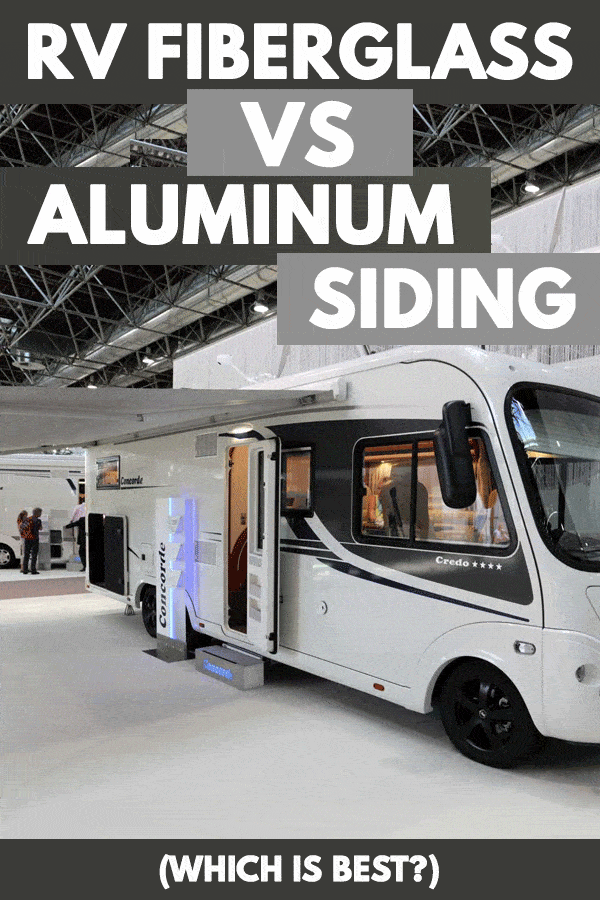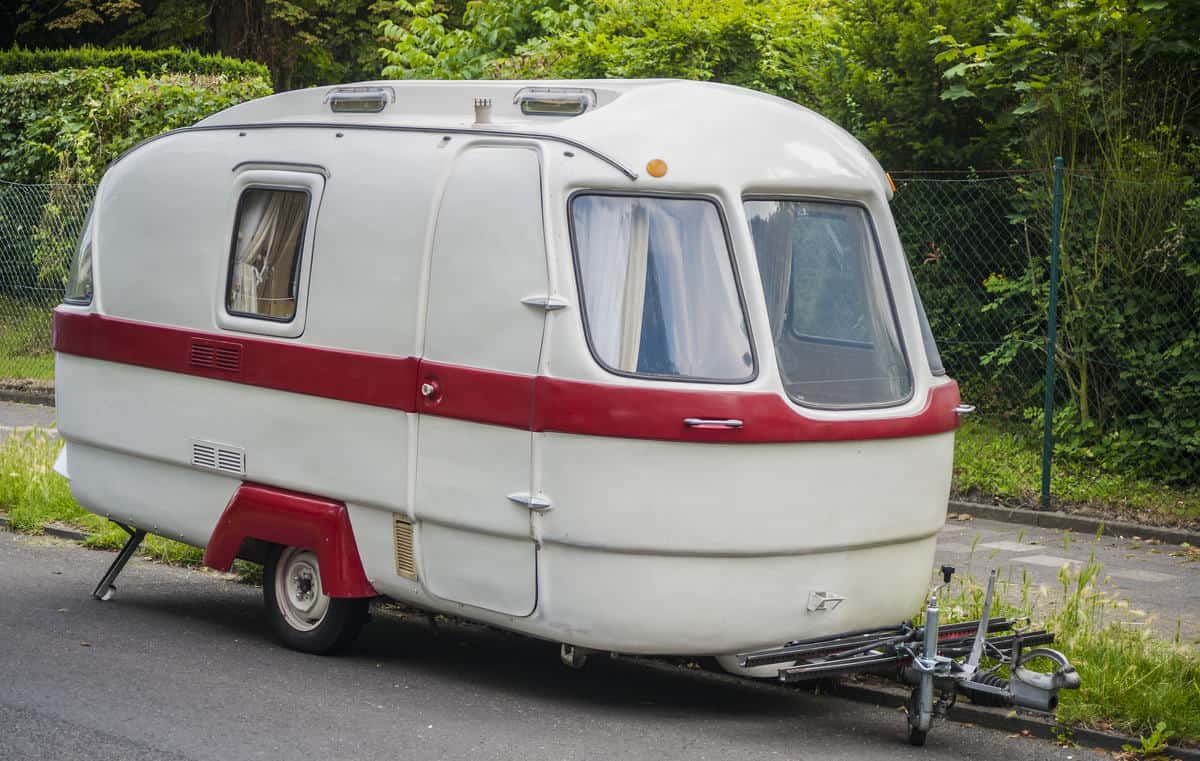 As you search through RV listings, you will likely notice that the vast majority of trailers are made out of either aluminum or fiberglass. The obvious question is: which is best? To help you decide we have studied everything there is to know about these common RV siding materials. From expert information to regular owners weighing in on popular RV forums, we have discovered all of the advantages of each type of RV siding.
As you search through RV listings, you will likely notice that the vast majority of trailers are made out of either aluminum or fiberglass. The obvious question is: which is best? To help you decide we have studied everything there is to know about these common RV siding materials. From expert information to regular owners weighing in on popular RV forums, we have discovered all of the advantages of each type of RV siding.
While the answer to this question will ultimately depend on how you plan on using your RV and what your budget is, I would have to declare fiberglass the current RV king. Fiberglass RV construction simply offers more advantages than does aluminum. And that's why so many manufacturers are turning to this relatively new method these days. But the main thing is that owners are generally happy with their fiberglass trailers - more and more fiberglass trailers are being built every year to accommodate demand.
Stay with us as we explore all of the pros offered by each type of RV construction. The specifics might surprise you and even change your mind about which type of RV is right for you.
Fiberglass vs Aluminum Siding
Aluminum
While the very first commercial RVs used a steel construction, it wasn't long before aluminum came onto the scene. One of the first manufacturers to use this lightweight metal was Airstream. In fact, that company has been making their trailers out of this stuff since 1936.
Compared to steel, aluminum has many advantages. First of all, it is more malleable than steel, meaning it can be bent and molded into place more easily. This gives RV-makers the ability to incorporate rounded shapes, such as that iconic Airstream fuselage. Aluminum is also more resistant to rust - no paint or treatment is required, making manufacturing simpler and cheaper. Of course, aluminum is also much lighter than steel, which is a huge benefit when it comes to RVs.

Pros
Price: Constructing a trailer out of aluminum reduces the cost of manufacturing, sometimes by thousands of dollars. If you are new to RVs or want to keep your upfront cost as low as possible, this advantage is huge.
Proven Technology: While fiberglass is a relatively new RV technology, aluminum has been around for just about as long as RVs. That's a lot of time for makers to have perfected their craft! This fact makes gives many owners peace-of-mind when making a big investment in a new trailer.
Commenter Oasisbob clearly feels that aluminum is the better choice for this reason, as he illustrated on the rv.net forums:
"If given the choice I will take aluminum every time. Here is why. Aluminum is proven and easy to replace. Ever hear of aluminum delaminating? Nope."
No Delamination Worries: Which brings us to another upside for the metal in the aluminum vs fiberglass debate. Fiberglass can potentially delaminate, which is the process that occurs when the outside fiberglass material separates from the underlying material. The resulting "bubble" can crack open, creating an unsightly RV and potentially resulting in moisture seeping inside of the trailer walls. Of course, aluminum will not have this problem, so that's one big issue aluminum RV owners will not have to worry about.
Easier to repair: this advantage goes along nicely with the first one. Should your trailer become damaged, it will be much easier to repair a dented or broken aluminum panel than a fiberglass one. That's because each aluminum panel can simply be replaced. That means it will be faster and cheaper to fix. This is especially the case with corrugated (rather than smooth) aluminum. Fiberglass (and smooth aluminum) trailers use larger panels that often require repairing the problem area - a longer and more costly process than replacement.
Fiberglass
First, what exactly is fiberglass? I assume everyone is familiar with aluminum, thanks to its many uses. Fiberglass, however, is slightly less common. The material is constructed using plastic and glass fiber. Some of its more interesting properties are its high strength-to-weight ratio, non-conductivity, and moldability. That last quality is what allows RV manufacturers to form the fiberglass into all sorts of interesting shapes not possible with other materials.
Compared to aluminum, fiberglass is a newcomer to the RV world. Credit goes to Canadian-based RV company Boler for manufacturing the first fiberglass-bodied RV in the late 1960s. The technology failed to take off at first, however.

Pros:
Resale: Currently, and for the foreseeable future, fiberglass RVs keep their value better than aluminum RVs. MtCamper, a commenter on irv2.com, explained one theory as to why:
"The fiberglass is ... the current trend so it will have better resale value. "
Whatever the reason, however, this is a great advantage for fiberglass RVs. After all, what RV owner doesn't want to maximize their investment?
Maintenance: Many RVers who have owned both aluminum and fiberglass have found that the fiberglass trailers are easier to maintain and clean. For instance, chuck_hammer stated the following on an irv2.com forum:
"I had the aluminum type before.. I do like the fiberglass better. and its easier to clean. my opinion."
Less prone to dents: While it is cheaper and faster to repair aluminum in most cases, fiberglass is better at resisting small dings than aluminum. ScottG commented on an rv.net forum that fiberglass is the only construction for him from now on:
"I've had several of each and I will never own another corrugated aluminum RV. Way too hard to keep from leaking and dents and dings appear out of know (sic) where. "
Aerodynamics: Fiberglass construction allows for a smooth-sided RV, whereas most aluminum trailers use a bumpy, corrugated construction. This smooth quality will slip through the air much more easily than the bumpy metal, making fiberglass trailers more aerodynamic than most of their aluminum counterparts. While the resulting mpg gain will likely be small, it can really add up if you plan on driving a lot of miles with your RV.
Aesthetics: Okay, so this is clearly a very subjective advantage, but it does seem that today, most people prefer the looks of fiberglass trailers over their aluminum competitors. Those desiring the most modern, stylish trailer will probably find that they are drawn to fiberglass trailers, even if they don't realize it at first. How do I know? Because that was me when I bought my first trailer. Without realizing it, I was naturally drawn to the look of fiberglass trailers such as the Scamp and Casita over corrugated aluminum trailers.
The Winner Is...
With each material offering so many advantages, it is impossible to declare one superior to the other. Sure, there are currently more advantages we can give to fiberglass, but that doesn't make it the right material for every RV.
If you are like most people, your decision will likely come down to cost. If you are searching for the absolute cheapest trailer out there, you will find that aluminum RVs, especially on the used market, offer a much bigger bang for your buck. On the other hand, if you are willing to spend a little more to get a more aerodynamic, maintenance-free material fiberglass will probably appeal to you. And if you are planning on selling the trailer again after just a few years, that extra upfront cost might just come right back to you, thanks to the tendency for fiberglass RVs to hold their value better.
Find What Works for You
Hopefully, this article has provided you with all you need to know about the fiberglass versus aluminum debate. The fact that there are ardent supporters of each material in the RV community should tell us that there is no clear winner, but by learning the pros and cons of each, you should be able to decide which one is right for you.

Building a small. Trailer wat should i use???
Henry, we hope that the article gives you some great ideas. We can’t give you specific opinions. The answer is different for everyone.
Thank you. Wats the types to put over wooden trailers